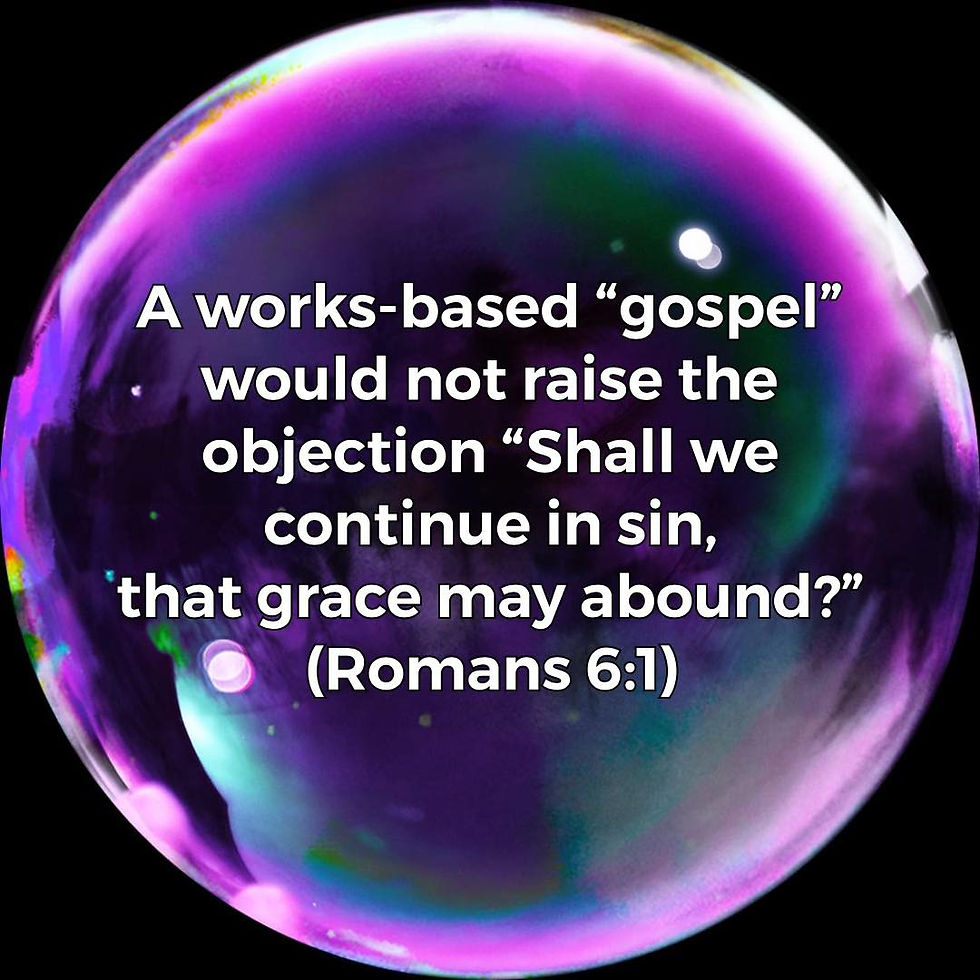Romans 6:1: The same objection to the same Gospel
- Bible Brian

- Apr 13, 2022
- 3 min read
Updated: Oct 11, 2023

A common objection to the Gospel, from both its reception through faith alone, and its necessary conclusion of Eternal Security, is the attitude it supposedly produces. Specifically, if we aren't saved by works, and therefore cannot lose salvation by works, what motivates us to live holy lives? Or, as Paul puts it, "shall we continue in sin that grace may abound"? (Romans 6:1).
Now, how is it that Paul anticipates the same objection to his Gospel that we so often hear to ours? It makes sense that Paul anticipates the same objection to his Gospel precisely because we have the same Gospel. Paul preached salvation by grace, through faith, to works, not through works. Thus, some might ask, why don't we just sin to our heart's content? But does such an objection ever present itself to works based "gospels"? "You need faith and works to be saved" "Well then why can't I just have faith and forego the works?" It just doesn't make sense, does it? Any "gospel" that requires works to save, or maintain salvation, answers by default "shall we continue in sin that grace may abound?"
But the actual Gospel does need such clarification, and so the word of God does indeed clarify it. And so Paul continues to say "God forbid. How shall we, that are dead to sin, live any longer therein? Know ye not, that so many of us as were baptized into Jesus Christ were baptized into his death? Therefore we are buried with him by baptism into death: that like as Christ was raised up from the dead by the glory of the Father, even so we also should walk in newness of life. For if we have been planted together in the likeness of his death, we shall be also in the likeness of his resurrection: Knowing this, that our old man is crucified with him, that the body of sin might be destroyed, that henceforth we should not serve sin. For he that is dead is freed from sin. Now if we be dead with Christ, we believe that we shall also live with him: Knowing that Christ being raised from the dead dieth no more; death hath no more dominion over him. For in that he died, he died unto sin once: but in that he liveth, he liveth unto God. Likewise reckon ye also yourselves to be dead indeed unto sin, but alive unto God through Jesus Christ our Lord. Let not sin therefore reign in your mortal body, that ye should obey it in the lusts thereof. Neither yield ye your members as instruments of unrighteousness unto sin: but yield yourselves unto God, as those that are alive from the dead, and your members as instruments of righteousness unto God. For sin shall not have dominion over you: for ye are not under the law, but under grace. What then? shall we sin, because we are not under the law, but under grace? God forbid. Know ye not, that to whom ye yield yourselves servants to obey, his servants ye are to whom ye obey; whether of sin unto death, or of obedience unto righteousness? But God be thanked, that ye were the servants of sin, but ye have obeyed from the heart that form of doctrine which was delivered you. Being then made free from sin, ye became the servants of righteousness."
From this, we see that the objection doesn't hold. If your faith is true, you will act like it. Works are a result, not a cause. And what do you know? This is the same answer we give today when the same objection is raised against Sola Fide and Eternal Security!
As Christians, we teach the same Gospel as Paul taught. We are saved by grace, through faith, not of works. Heretics and unbelievers continue to raise the same objection Paul anticipated: This permits lawlessness. The answer is the same today as it was 2,000 years ago: Those who are saved by grace will live by faith, not merely using salvation as a get out of jail free card, but living as if sin is toxic, and righteousness is the state of the Kingdom we inherit, not by our own works, but by the precious blood of the Lamb. After 2,000 years, you would think the world would have learned, but we should never underestimate the pride of men who believe Jesus needs their help to save them.






Comments